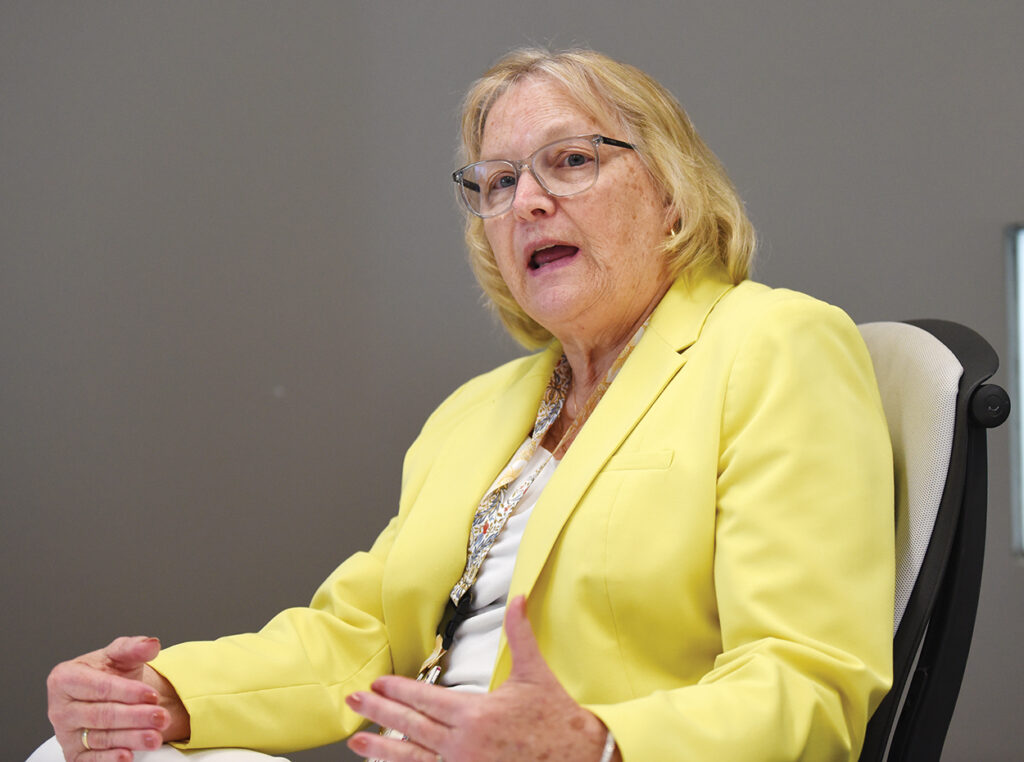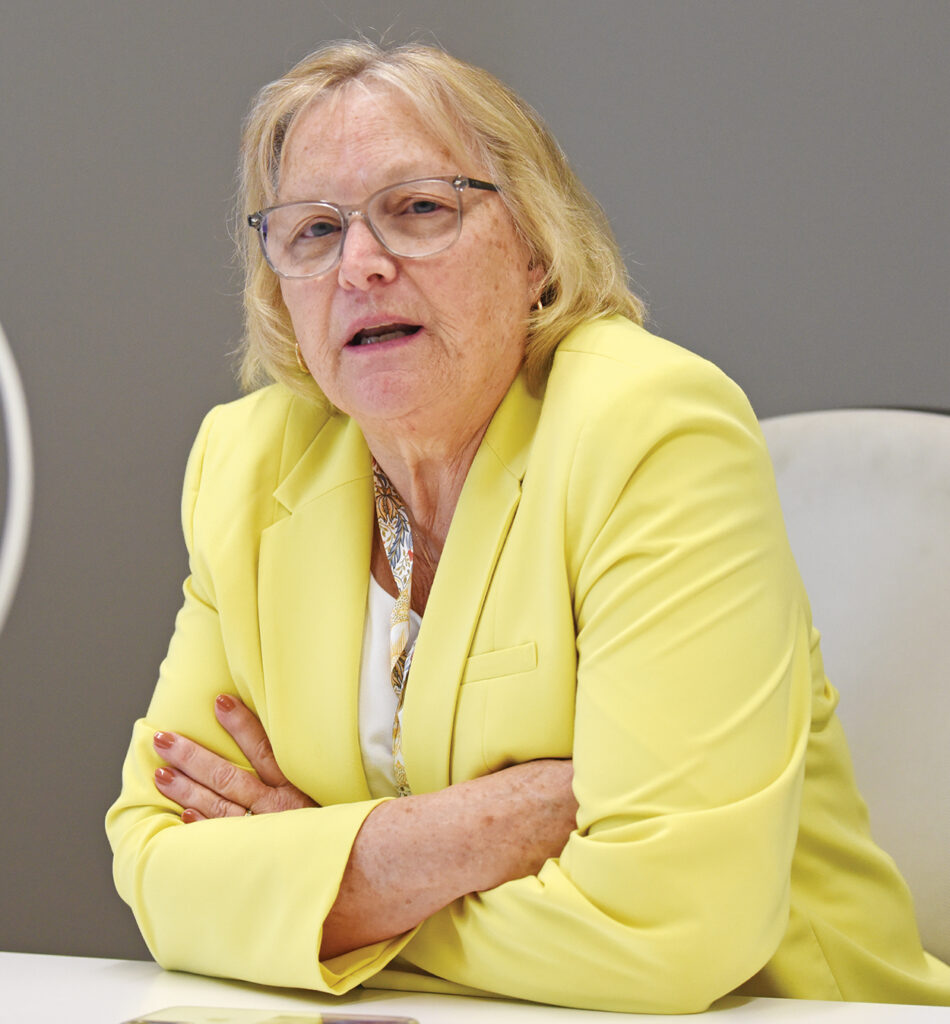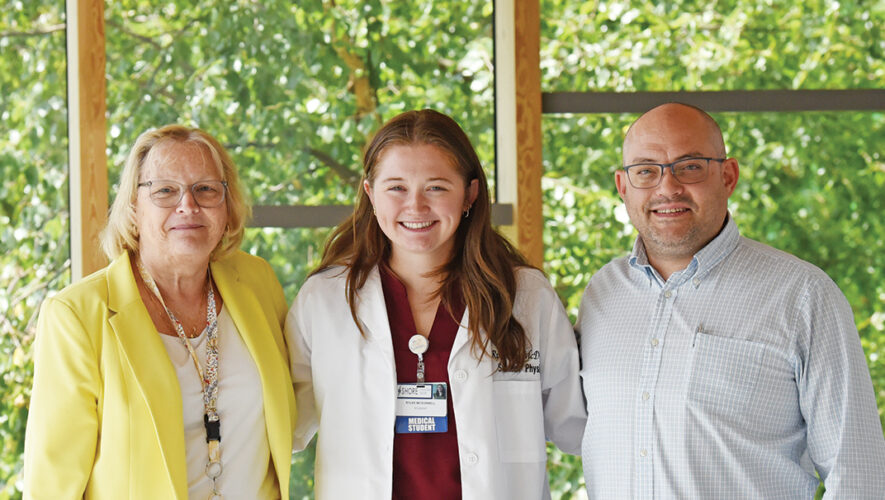Editor’s note: See related stories on the program at Shore Medical Center hosting third-year medical students from Philadelphia College of Osteopathic Medicine online at ocnjsentinel.com. Those stories appeared in last week’s edition of the Sentinel.
SOMERS POINT — Chris Wodazak is the den mother for the 10 medical students at Shore Medical Center, making sure they’re matched with doctors for their rotations and looking out for them in so many other ways.
Den mother isn’t her real title — that would be core clinical campus coordinator for the educational program between Shore and the Philadelphia College of Osteopathic Medicine.
That is just part of her responsibilities. Wodazak is the care expediter at Shore Quality Partners, which she explains is a clinically integrated network of independent physicians, employed physicians through Shore Physicians Group (SPG) and Shore Medical Center “working together for the common good.”
With those connections, Wodazak is the right person to coordinate the third-year medical students’ rotations and needs from the hospital’s end.
RELATED STORY: THE LIFE OF A MED SCHOOL STUDENT
Dr. Leonard Galler said she is integral to the educational partnership in multiple ways.
He is chairman of the Clinical and Administrative Surgical Department at Shore and the surgical adviser to the PCOM program. Dr. Daniel Jacoby, the medical director for hospital medicine at Shore, is the medical adviser to the program.

“When we started this venture, one telephone call went to (Wodazak), who has all the skills and she became the director of the PCOM program,” Galler said. “She’s more than the director. Besides coordinating everything, doing all the paperwork, making sure all the credentialing information is fine, she also embraces every one of these students.
“She makes sure that they’re happy, that they’re being treated properly, she protects them,” he added. “She makes sure they have something to do on the weekends, she goes and calls all the organizations in town” to see if they’ll supply support to the students as well, such as tickets to events or dinners.
“That’s the woman who put this together,” Galler said, pointing at Wodazak. “She did this with very little support financially and it’s made it a brilliant thing. That’s the woman who deserves the credit.”
This is the second session of Shore hosting PCOM medical students. Last year, in its initial year of the partnership, the hospital offered 10 slots to the third-year students at PCOM. Eight were filled.
This year Shore offered 10 slots and 10 students filled them along with two physician assistant students.
Wodazak said the program is valuable for the students at a location such as Shore Medical Center, and also for the doctors who are mentoring them on their rounds.
“Not one doctor has said no to me. They’re excited to be part of the program,” she said in an interview with the Sentinel on Aug. 28. “It’s reinvigorated some of our more senior doctors who have dealt with health care as it is today. With students coming into the program, some of (doctors’) excitement — from when they first started in medicine wanting to help the world — has kind of come back. They’re excited to be part of this, to share their knowledge. I think being part by teaching and talking about their specific specialities they’re also reenergized.
“That has been a good thing for the community all around.”
Wodazak explained Shore Medical’s proximity to Ocean City and Atlantic City, with their influx of tourists, means the students get to see a lot of different things.
“Some are strange, some odd, some serious, some stupid, but they get a broad spectrum of what is out there that needs to be taken care of,” Wodazak said. That runs the gamut from the gross to the miracle of birth.
“One student was thrilled because he got to see maggots in a wound on his first day of his rotation,” she said. “We kind of take it for granted, but for a student to see some of these things on the first day rotation, it’s like wow. Or the student who got to help delivering a baby. She isn’t going to go into OB-GYN, she wants to be a primary care, but she got to deliver a baby. Those kinds of things excite the student and that excitement in turn excites the preceptor.”
There are advantages for the students working in a community hospital such as Shore, compared to places like Penn or Jefferson in Philadelphia.
For one, there is diversity.
“You can have a heart attack one bay, a fishhook in the mouth in the next bay and then something else,” she said. “Working in the E.R., we have a hybrid pediatric unit so the student is slated to do the rotation in (pediatrics), but if something interesting comes in, it’s nothing for the E.R. doc to pull that student into the E.R. to see whatever is happening.
“They have a lot of one-on-one with the doctors and I think they get a varied idea of what happens here in the hospital. It’s more wide-ranging, it’s more personal, a lot more personal,” Wodazak said.
“We offer more services here in this one building. In Philly, cardiology is in a separate building, endocrinology or surgery is in another building. Here it’s all in one building. The nurses call them in and say, ‘Come look at this. Come see what this looks like. I have a patient who has MRSA. Come see what MRSA looks like.’”
Galler noted one day when a preceptor wasn’t available in the psychiatry rotation, they were able to send a student upstairs to spend a day in pathology instead.
“They can be doing their general surgery rotation and they’re finished with the cases, they can be told to go down the corridor and ask the nurse if they can come in,” Galler continued. “The doctor will say yes and suddenly they’re in neurosurgery, gynecology, podiatry, oral surgery. That they really can’t do at the bigger hospitals.

“We had someone who finished in X-ray, we sent them up to (pediatrics) or we gave them the opportunity to go to the E.R. because we had that capacity. That’s something very special. There’s not any downtime,” Galler said.
“I also tell this about the students. They don’t take downtime. They’re reading all day, they’re studying all day. We have a special area for them with a dedicated library that Chris put together. We got the doctors to put in journals. They have a space all to themselves,” Galler said.
The students also get to spend time and talk to the top administrators at the hospital.
The leaders “all invited the students to come in and spend a few hours and see their stresses because being a doctor requires knowledge and asking for things. You have to see what it takes to get those things available and do what it takes. That’s something they will not have at the bigger organizations.”
Wodazak said the feedback from the students on working with the doctors has been all positive.
“We all have our little idiosyncrasies and our individual personalities, but all of the students have come away saying, ‘I’ve learned something. I learned a lot. I really enjoyed that rotation.’ It’s all been positive. There hasn’t been any negative,” she said.
So what does Wodazak get out of the extra workload?
“I love doing this. I’m their den mother. If you need me, call me. I don’t care what time of day because I’m looking at them as my children,” she said. “They’re away from home, a lot of them, some of them they don’t have anyone local other than another student, so I enjoy working with them.
“I think it’s exciting that we have students here learning from our doctors, who are some of the best. I’ve worked in this community for 50 years and my one child was born here. I know these people and they’re all good people,” Wodazak said.
“And they’re not just teaching them medicine. They’re teaching them how to be good doctors, how to be good people. How to listen to their patients. I think that is also another benefit of being here at Shore. I enjoy that part very much.”
Galler said the first class of students gave Wodazak an award “for being basically the most outstanding contributor to their education.”
The students, she said, “have enough to worry about learning medicine. They don’t have to worry about the other minutia that goes along with scheduling their rotations and classes. I do that for them. I try to make it easier for them.”
– PHOTOS and STORY by DAVID NAHAN/Sentinel staff
At top, Rylee McDonnell, center, a 2017 Ocean City High School graduate, is a third-year medical student doing her rotations at Shore Medical Center. At left is Chris Wodazak, the core clinical campus coordinator for the medical student program between Shore and the Philadelphia College of Osteopathic Medicine. At right is Dr. Daniel Jacoby, the medical adviser to the program and the medical director for hospital medicine at Shore Medical Center.



